Optimism and reality check at Korea Global Forum 2015
In Korea Global Forum 2015, co-hosted and organized by Kyungnam University and sponsored by the Ministry of Unification, active and former government officials and prominent scholars from Asia, Europe, North America, and Oceania gathered to reflect on the history of Korea’s division and contemplate the peninsula’s future amid the shifting geopolitical dynamics in East Asia and the South Korean government’s ongoing initiatives toward enhancing regional peace and prosperity.
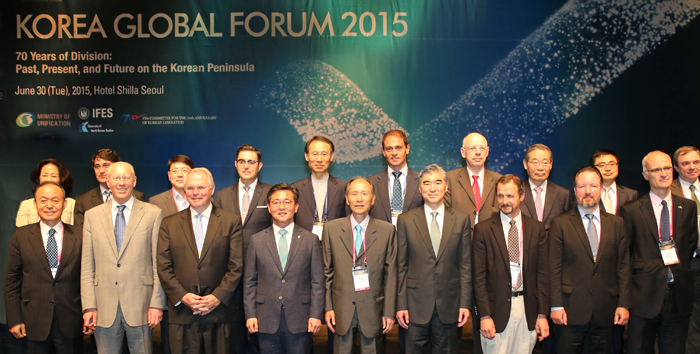
Prominent speakers and participants at the recent June forum in Seoul included a number of recognizable names from the diplomatic community, government, and academia. Among them were Yong-Pyo Hong, current ROK Minister of Unification; Jae Kyu Park, former Minister of Unification and current President of Kyungnam University (KU); Christopher R. Hill, former US Assistant Secretary of State for East Asian and Pacific Affairs, now Dean of the Josef Korbel School of International Studies at the University of Denver; Sung Kim, former US Ambassador to Seoul and now Special Representative for North Korea Policy at the US Department of State; and John Everard, former British Ambassador to the DPRK.
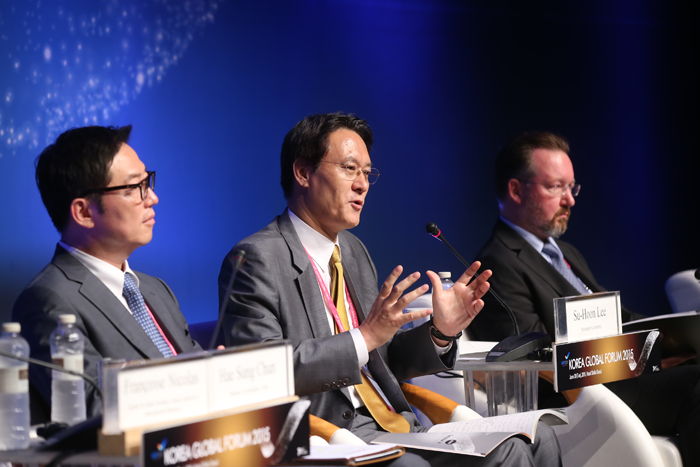
What follows herein is a general summary of some of the key issues raised and opinions expressed in the presentations and discussions at the conference.
Honor, fear, and interests
Leading off the forum’s first session, titled ‘The Future of the Korean Peninsula and the East Asian Order’, was Frank Jannuzi, former Policy Director at the US Senate Foreign Relations Committee and current President and CEO of the Maureen and Mike Mansfield Foundation. He expounded on two Cold War legacy issues that “harbor the greatest risk of great power conflict” in Asia: Taiwan and the division of the Korean Peninsula. According to Jannuzi, the defining geostrategic event of the post-Cold War era has been the rise of China and the subsequent US response, which has mostly been accommodating and is developing into a deeper Sino-US relationship. Nevertheless, Washington’s recent increasing trend of hedging is visible, as the US wants to engage China but also seeks to counterbalance in the case of diverging interests. Talking on the immediate security challenge posed by North Korea’s nuclear ambitions, he highlighted Pyongyang’s doggedness and risky behavior, but also underscored that despite the broad agreement among members of the international community to halt and verifiably dismantle North Korea’s weapons programs, such consensus “masks the important differences among key actors on how best to promote denuclearization and peace on the Korean Peninsula.” Disunity on tactics, lack of coordination in their approaches, differences over the “end game,” and fear of what orbit a unified Korea may lean toward--i.e., China or Japan--remain as challenges. As elucidated in his paper, “the real problem is prolonged, unnatural division of the Peninsula.” With regard to building of security architecture in the region, Jannuzi expressed that Asia alone cannot manage Asia’s security challenges, and that only the US-led ‘hub and spoke’ system offers sufficient functionality.
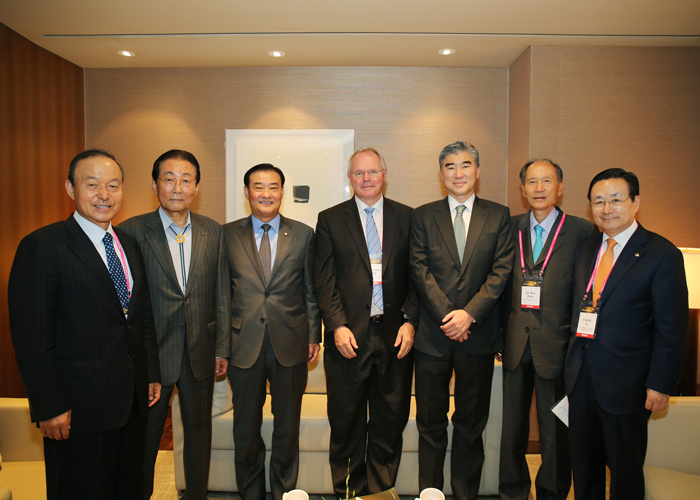
Neutrality for a unified Korea?
Alexander Zhebin, Director of the Center for Korean Studies at the Institute for Far Eastern Studies of the Russian Academy of Sciences, then sparked controversy with his remarks about how the “neutralization” of a unified Korea would be the most “acceptable option to those interested in an early and peaceful Korean settlement,” with the four major powers giving formal guarantees to the unified Korea’s neutral status. On the nuclear issue, “it is of fundamental importance for Russia to bring about a peaceful and sustainable climate for the region where there are still sources of tension and conflicts and a growing risk of proliferation of weapons of mass destruction,” stated Zhebin. He also mentioned how Russia envisions itself as an active participant working toward establishing “an effective mechanism to strengthen peace, security, mutual trust, and mutually beneficial cooperation in Northeast Asia” as a component of a new security architecture in the Asia-Pacific. Concerning Russia and inter-Korean relations, he referred to Russian president Vladimir Putin’s support of the aspiration of Koreans for national unification, but that Moscow should take in the interests of both Koreas, that nothing should be imposed on Koreas’ neighbors, and that a unified Korea under US influence would not be welcomed by Russia--fearing an “Asian clone of the NATO.” Overall, in his view, there exist security and economic reasons for Russia “to be vitally interested in peace, reconciliation, and unification of Korea.”
South Korea’s position on unification
The second session, titled ‘A Unified Korea and International Cooperation’, began with a presentation by Hae Song Chun, Assistant Minister of Unification. According to Chun, the South Korean government aspires to create a new, unified country. He pointed out that Korea’s Constitution renders unification as something that must be achieved as an obligation of the state. So a unified Korea means that all of the members of the community hold the universal principles of welfare and justice and freedom, and these principles must be reflected in a unified state. The Korean government’s vision should be based on the principles of liberal democracy and economy. Small-scale unification through cultural and economic cooperation must first be achieved, and by doing so large-scale unification can be realized in the long run. The type of unification that the incumbent government in Seoul is pursuing is one that contributes toward the region and the international society, and that the international community should actively work toward this goal.
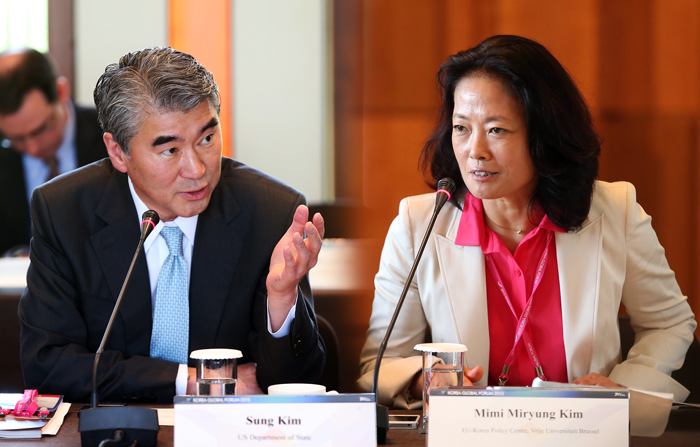
Lessons from Germany
Rudiger Frank, Professor of the University of Vienna, followed with a few remarks. As a specialist in East Asia economics, Dr. Frank noted that, on the political dimension, the case of German unification is a very good case to look at when considering how to handle the situation in Korea. According to Frank, the German government has managed its process quite wisely--particularly its relationship with France--despite the difficulty and pain involved. He mentioned the necessity of ensuring a cooperative international environment for unification and recommended a four-point process to solving all the questions and issues surrounding unification: identify them, evaluate them, develop a strategy to deal with the concerns, and have a public discussion about the preferred strategies. On the economic dimension, he stressed that time would be crucial for success of Korean unification. “Korea will not have forever to spend money to revitalize the economy,” noted Frank. Experiences elsewhere have shown that a population is only willing to accept the subsequent hardships for a limited time. So the period of transformational recession should be kept as short as possible, suggested Frank. To do that, South Korea will need help in implementing the unification, and should seek help from other countries. In this regard, Frank recommended that Korea consider being much more open to foreign direct investment. He ended with a call for preparation, and caution: “As in the German case, once the process of unification starts, there will be no time to think. All you can do is act.”
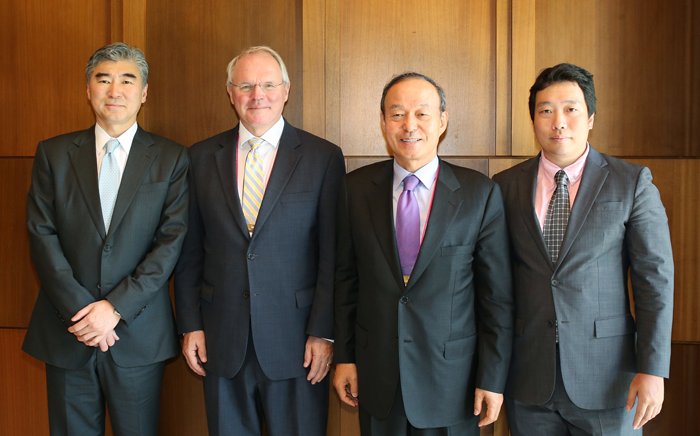
A European perspective on a unified Korea
The third presenter of the session, Francoise Nicolas, Director of the Center for Asian Studies at France Institute of International Relations, commented on unified Korea and the European Union (EU) contribution to this endeavor. To begin, Dr. Nicolas criticized that “Unification is a complex, multi-faceted notion,” calling for several distinctions to be made. One is between the process and the end result. “If you focus on it as a process, then the EU’s contribution will be on building trust and institutions,” whereas if you focus on the latter, the EU would contribute in management of the situation. In her view, however, the real issue is integration, with the sequence also being important. The different approaches are another distinction to consider. According to Nicolas, the vision of a unified Korea based on liberal democracy and economy that Seoul has in mind is likely not shared by the regime in Pyongyang. Personally, she sees Korean unification as transpiring suddenly and unexpectedly, not gradually, and being much more complicated than the German case. She also reminded participants that in Germany’s case, it was the East Germans who chose to unite; at present, North Korea is unlikely to have that desire. Overall, in her opinion, lessons can be inferred from other parts of Europe, especially on the complexity of social integration. And while she sees the EU as too far to actually contribute to the path to unification until it actually transpires, she did propose a number of concrete steps that the EU could take at some point, such as participate in the industrialization of Kaesong, encourage European companies to participate in economic zones, and provide financial assistance to help a unified Korea with the overall unification costs by creating a fund dedicated to this issue, among others steps.

International dimension of German unification
The final panelist to present was Christian Wagner, Senior Fellow of the German Institute for International and Security Affairs. Dr. Wagner opened by mentioning that while Germany was divided for some 40 years, the country has now experienced 20 years of unification. He stated that Germany’s successful reunification after 1990 was due to a combination of factors: domestic reforms and massive investments, and the support from regional institutions for the process of transformation. He mentioned that while the situation on the Korean peninsula saw confrontation between the antagonistic blocs of the Cold War, leading to the Korean War, Germany saw only a series of crises--like the 1948 blockade of Berlin, 1956 rebellion in Hungary, and 1961 construction of the Berlin Wall. Wagner also spoke of how the Cold War facilitated the collaboration between Western countries supported by the Marshal Plan, and the emergence of institutional framework that included the EEC, Euratom, and other regional organizations. In contrast to the situation in Korea, the economic, political, and cultural relations between the two Germanys never broke down completely. He also emphasized that the different levels of cooperation between the two Germanys and regionally with the 1970s’ Helsinki process helped to make the “iron curtain” permeable. Furthermore, in the 1990s, Germany’s strong economic position in the EU helped to overcome the repercussions of East Germany’s economic collapse. All told, while the “international constellations in the Korean peninsula” vary from what took place in Germany, he suggested that the German experience can serve as a source of encouragement, and that “the constant engagement in regional institutions can be an important long-term investment for the process of reunification.”
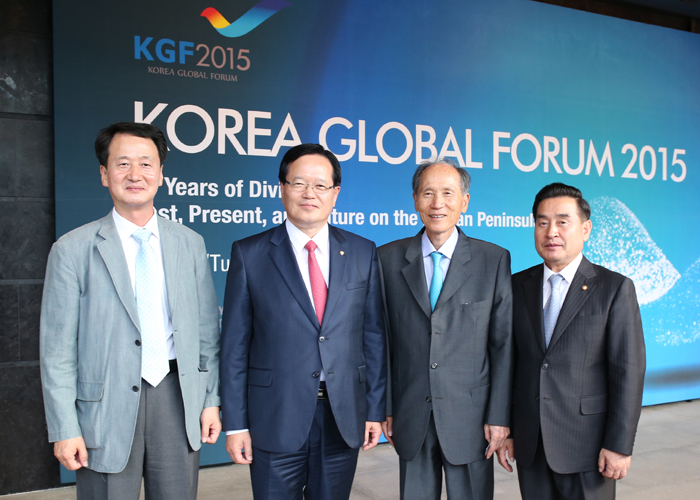
Reality check
Not all agreed on what was presented or shared in the optimism. Leszek Buszynski, Professor at the National Security College of Australian National University, called for a reality check. As he sees the situation, North Korea’s core issue is regime survival, making it extremely difficult to pursue unification initiatives discussed by the conference participants.
Bilahari Kausikan, Singapore’s Ambassador-at-Large and Policy Advisor at the Ministry of Foreign Affairs, expressed his skepticism on the issue of unification, acknowledging that the international community’s sympathy for the Koreans will unlikely be matched with adequate support. In short, he suggested that South Korea assume that it will enter unification and the problems therein by itself, with US and EU support to come, but the extent of that support will be determined by future circumstances.
Vasily Mikheev, Vice President of the Institute of World Economy and International Relations at the Russian Academy of Sciences, spoke on the unification issue, first stating that the only possible variant of unification is absorption of the North by South Korea on the principles of a market economy, which Pyongyang is against. That means unification of this form will not happen by consensus. He also raised important questions that require answers from Seoul: Who will provide for day-to-day security and administration of the North Korean people? What will happen to North Korean bureaucrats? What will be done to mitigate the risks of growing ‘banditry’ among North Koreans? Essentially, the question of how South Korea would govern North Korea in a unification-by-absorption scenario needs to have priority over some of the other questions that have been asked.
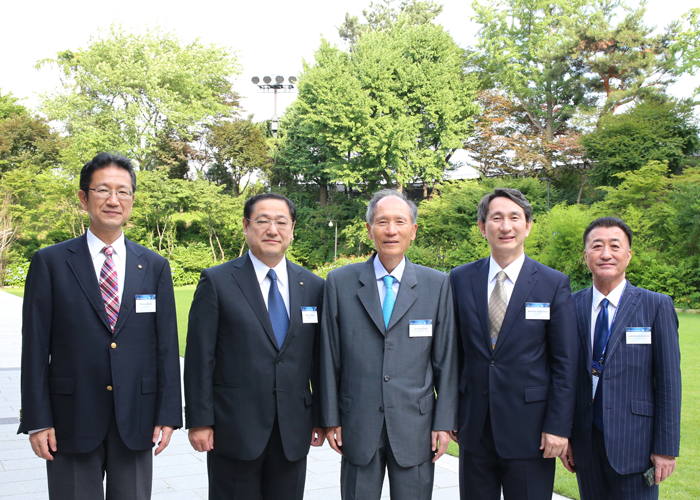
Closing out the final session with greater optimism, Su Hao, Director of the Center for Strategic and Peace Studies at China Foreign Affairs University, cited his own attendance at a conference in Beijing in the morning and participation at the KGF in Seoul that afternoon as a representation of how close South Korea and China actually are. He emphasized that compared to 70 years ago much has changed, especially in China. International cooperation regarding the issues in East Asia requires closer Sino-ROK cooperation to address them. In his view, Korean unification will occur in the future, but cautioned that variables from outside may intrude. According to Su, “a unified Korea would be good for China,” strategically and tactically, and that China would like to encourage a peaceful unification. On a final note, he encouraged the two Koreas to integrate into South Korea’s economic architecture.
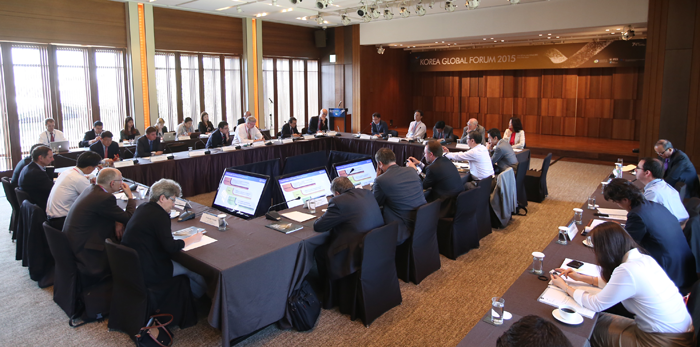
Korea Global Forum 2015
-Delegates
Leszek Buszynski Professor, National Security College, Australian National University
Chaesung Chun Professor, Seoul National University
Hae Sung Chun Assistant Minister, Ministry of Unification, ROK
Oleg Davydov Deputy Chief of Mission, Embassy of the Russian Federation
John Everard Former British Ambassador to North Korea
Fang Kun Division Director, Dept. of Asian Affairs, Ministry of Foreign Affairs, China
Rudiger Frank Professor, University of Vienna
Frank Jannuzi President and CEO, Maureen and Mike Mansfield Foundation
Kenji Kanasugi Minister & Deputy Chief of Mission, Embassy of Japan
Bilahari Kausikan Ambassador-at-Large and Policy Advisor, Ministry of Foreign Affairs, Singapore
Sung Kim Special Representative for North Korea Policy, US Department of State
John Langtry Assistant Secretary of Northeast Asia Branch, Dept. of Foreign Affairs and Trade, Australia
Duk-haeng Lee Senior Policy Cooperation Officer, Ministry of Unification, ROK
Vasily Mikheev Vice President, Institute of World Economy & International Relations, Russian Academy of Sciences
Francoise Nicolas Director, Center for Asian Studies, France Institute of International Relations
Junya Nishino Professor, Keio University
Jean-Christophe Noel Strategic Affairs Officer, Ministry of Foreign Affairs, France
Ihn-hwi Park Professor, Ewha Womans University
James Person Deputy Director, History & Public Policy Program, Woodrow Wilson International Center for Scholars
Su Hao Director, Center for Strategic and Conflict Management, China Foreign Affairs University
Christian Wagner Senior Fellow, German Institute for International and Security Affairs
Alisdair Walker Political Counsellor, British Embassy
Chang Seok Yang Auditor, Kaesong Industrial District Foundation
Alexander Zhebin Director, Center for Korean Studies, Russian Academy of Sciences
-Special Guests
Christopher R. Hill Dean, Josef Korbel School of International Studies, University of Denver
Yong-Pyo Hong Minister, Ministry of Unification, ROK
Jin-ha Hwang Chairman, National Defense Committee, ROK
Ui-hwa Jeong Speaker, National Assembly, ROK
Chul-ki Ju Senior Secretary to the President for Foreign Affairs and National Security, ROK
Mimi Miryung Kim Executive Director, EU-Korea Policy Centre, Vrjie Universiteit Brussel
Sook-Jong Lee Professor, Sungkyunkwan University
Su-Hoon Lee Professor, Kyungnam University
Kyung-Won Na Chairperson, Foreign Affairs and Unification Committee, National Assembly, ROK
Jae Kyu Park President, Kyungnam University
Chul-min Park European Affairs Bureau, Ministry of Foreign Affairs, ROK
Minsoon Song President, University of North Korean Studies
Joun-yung Sun Chair Professor, Kyungnam University
By Dean J. Ouellette

